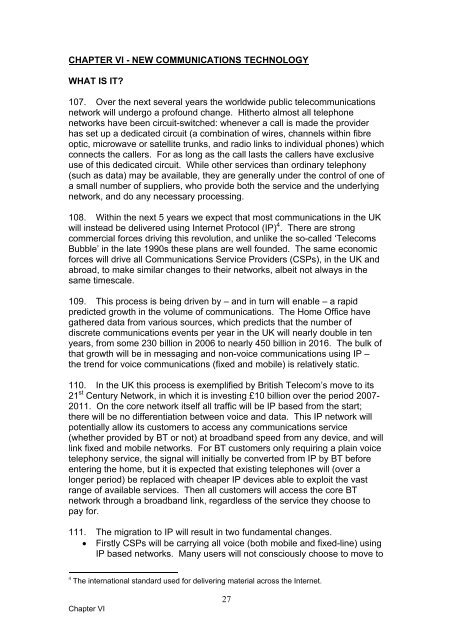Privy Council Review of intercept as evidence: report - Official ...
Privy Council Review of intercept as evidence: report - Official ...
Privy Council Review of intercept as evidence: report - Official ...
You also want an ePaper? Increase the reach of your titles
YUMPU automatically turns print PDFs into web optimized ePapers that Google loves.
CHAPTER VI - NEW COMMUNICATIONS TECHNOLOGY<br />
WHAT IS IT?<br />
107. Over the next several years the worldwide public telecommunications<br />
network will undergo a pr<strong>of</strong>ound change. Hitherto almost all telephone<br />
networks have been circuit-switched: whenever a call is made the provider<br />
h<strong>as</strong> set up a dedicated circuit (a combination <strong>of</strong> wires, channels within fibre<br />
optic, microwave or satellite trunks, and radio links to individual phones) which<br />
connects the callers. For <strong>as</strong> long <strong>as</strong> the call l<strong>as</strong>ts the callers have exclusive<br />
use <strong>of</strong> this dedicated circuit. While other services than ordinary telephony<br />
(such <strong>as</strong> data) may be available, they are generally under the control <strong>of</strong> one <strong>of</strong><br />
a small number <strong>of</strong> suppliers, who provide both the service and the underlying<br />
network, and do any necessary processing.<br />
108. Within the next 5 years we expect that most communications in the UK<br />
will instead be delivered using Internet Protocol (IP) 4 . There are strong<br />
commercial forces driving this revolution, and unlike the so-called ‘Telecoms<br />
Bubble’ in the late 1990s these plans are well founded. The same economic<br />
forces will drive all Communications Service Providers (CSPs), in the UK and<br />
abroad, to make similar changes to their networks, albeit not always in the<br />
same timescale.<br />
109. This process is being driven by – and in turn will enable – a rapid<br />
predicted growth in the volume <strong>of</strong> communications. The Home Office have<br />
gathered data from various sources, which predicts that the number <strong>of</strong><br />
discrete communications events per year in the UK will nearly double in ten<br />
years, from some 230 billion in 2006 to nearly 450 billion in 2016. The bulk <strong>of</strong><br />
that growth will be in messaging and non-voice communications using IP –<br />
the trend for voice communications (fixed and mobile) is relatively static.<br />
110. In the UK this process is exemplified by British Telecom’s move to its<br />
21 st Century Network, in which it is investing £10 billion over the period 2007-<br />
2011. On the core network itself all traffic will be IP b<strong>as</strong>ed from the start;<br />
there will be no differentiation between voice and data. This IP network will<br />
potentially allow its customers to access any communications service<br />
(whether provided by BT or not) at broadband speed from any device, and will<br />
link fixed and mobile networks. For BT customers only requiring a plain voice<br />
telephony service, the signal will initially be converted from IP by BT before<br />
entering the home, but it is expected that existing telephones will (over a<br />
longer period) be replaced with cheaper IP devices able to exploit the v<strong>as</strong>t<br />
range <strong>of</strong> available services. Then all customers will access the core BT<br />
network through a broadband link, regardless <strong>of</strong> the service they choose to<br />
pay for.<br />
111. The migration to IP will result in two fundamental changes.<br />
Firstly CSPs will be carrying all voice (both mobile and fixed-line) using<br />
IP b<strong>as</strong>ed networks. Many users will not consciously choose to move to<br />
4 The international standard used for delivering material across the Internet.<br />
Chapter VI<br />
27
















